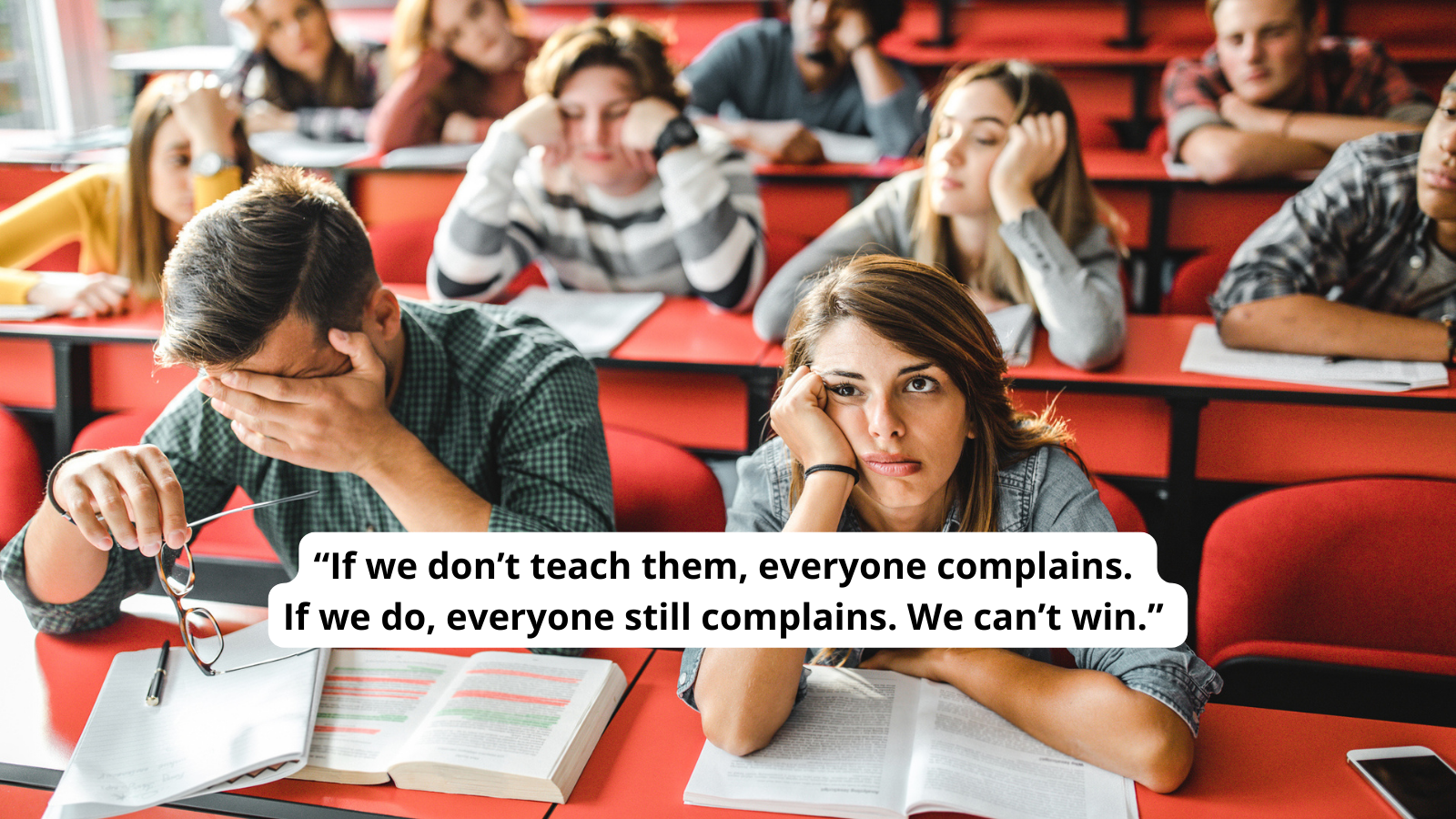Sigh, another day in the life of teaching students “no real skills,” a sentiment we educators often hear. You’ve likely come across the classic quips: “Sure am glad I learned about parallelograms instead of taxes during parallelogram season,” or “Yet another day not using the Pythagorean theorem.” It’s a familiar critique, suggesting we’re not equipping students with “real life skills.”
This school district introduced a Life Skills course.
A teacher at the school reported the course covers financial literacy, including taxes, types of bank accounts, financial planning, etc. The course also includes a maintenance unit, teaching students how to change a tire and do basic home repairs. The course is required, but students can count it as a math, social studies, or elective credit.
Sounds great, right?
But we all already know the outcome, don’t we?
Parents and students complained even more after the Life Skills course was added.
The teacher reports that parents complained the district “is asking too much of these kids” and “not giving them enough flexibility to build their schedules and choose the courses they’re interested in.”
Raise your hand if you’re surprised.
Why It’s Time To Stop Complaining About How Schools Don’t Teach “Real” Skills
More teachers weighed in with their experiences in response to the teacher’s story.
Schools already do teach “real” skills, but students think they’re boring and irrelevant.
Personal finance
“I taught personal finance—those students couldn’t care less about taxes and investing, it wasn’t relevant to their lives yet. We even covered renting and internet plans, and again, they couldn’t be bothered. … You know what they did care about? Pythagorean theorem. It’s on the construction apprentice test. I find it’s symptomatic of the ‘anti-intellectual’ movement in the US.” —MCMama5
“I love when I hear alumni say things like ‘they never taught us about taxes and bills in school!’ I’m always like ‘Dude that class was called personal finances and you hated it?!?’” —toddart
Purchasing a car and getting a job
“I did this last year, with units on pricing out purchasing a car, upkeep, insurance, and a whole job search/readiness/interview unit at the end … predictably, the few kids I’d had in other classes who always said ‘when am i gonna use this?’ with poor-faith intentions every day about other topics were busy trying to screw around on their phone or a game, and did almost no work.” —BlackstoneValleyDM
An “ELA in Life” unit
“I teach an ‘ELA in Life’ unit for my upperclassmen and … they don’t give a sh**. I go over resume writing, communications, email, drafting a letter, drafting a resignation letter, tone in an email, interviews/group interviews, STAR questions, even a bit of finance (student loans, credit, reading documents/contracts). Nope. Boring AF according to them.” —Schadenfreudian
A “Writing for Life” class
“In recent years, parents pushed for a ‘writing for life’ class. I met with them and admins, offering my experience in occupational writing. I volunteered evenings for Zoom meetings, developing half a year’s worth of units, which the board-approved parents voted for. … Surprisingly, none of the ‘future leaders’ or ‘gifted kids’ for whom the class was intended signed up.” —unWildBill
How to read a contract
“I used to do a unit on contracts and downloaded an apartment lease from the internet, a development near us. They always said I was lying about the costs. No, I’m not. I would ask basic questions about who is responsible for what in particular situations and fees incurred that only required reading, counting, and adding. Most only read a page in before declaring ‘Miss, this one’s not in here!’ It is, trust me, I wrote it, then went and found each answer. It’s there. The class averages hover at about 60%. Literally read and answer word for word, calculate amount of late fees for five days plus rent. Just takes time, that’s it. This gen will get screwed over a bunch of times before they decide to read.” —NapsRule563
Education is about exposure to a wide range of opportunities, not churning out robots.
“And yet, one of the difficulties of schooling is this growing, changing, unpredictable world. We have to teach a broad range of concepts because we don’t know what the future holds. Children need to learn to be flexible, this isn’t the Industrial Revolution anymore where we are a factory churning out drones.” —Exotichaos
“People don’t want to be asked to expand their minds. It all boils down to people just wanting schools to provide everyone a simple checklist of how to do their future job, hand out A’s and not ‘bore’ them with anything else (which they deem ‘useless’ as a convenience to their argument).” —nesland300
Our standards are designed to create well-rounded people.
“Most people are also too shortsighted to recognize how school gave them context to a lot of things in life. There is also just the basics of how to learn abstract ideas and such. All of the basics they cover become a foundation they can rely on. Of course many people decide they are ‘self-made’ and disparage the skills that helped get them where they are. Now, it is true that obscure history facts won’t always come up, but it gives us contextual and surrounding knowledge. It helps us to know why things are the way they are. It helps show ideas that have worked or failed in our lives. Education could be better presented, but it’s not nearly as useless as people like to pretend. They just have no idea how worse off they would be without formal education.” —Geodude07
“For me, education is about producing well-rounded individuals who have have the intellectual tool kit needed to participate in society, and laying the groundwork so if they choose to pursue more esoteric or creative interests, they know how to go about it. Education is about providing exposure to ideas and interests they otherwise may not have had the opportunity to learn.” —MuscleStruts
What schools can’t teach is EFFORT.
“I hear from kids who can’t be bothered to learn basic math facts that they don’t need to learn it because they’re going to be influencers, and I’m like ‘do you know how much work it takes to be an influencer? The video editing and videography work? The self-promotion and SEO? When you can’t even be bothered to fill out a simple worksheet about XYZ, you can do all that stuff to be an influencer?’” —Journeyman42
“I’ve noticed this too. Higher-order thinking outside our immediate needs often requires a bit of effort (such as in physics) and it’s frowned upon by people who expect everything to be handed to them.” —Andrea-therme
“And it’s not just about using the Pythagorean theorem irl in my opinion. It’s just as much developing the brain for mathematics and problem-solving.” —captain__clanker
The clamor for “real life skills” in education is a familiar tune, yet when schools actually introduce these skills, the backlash is immediate. As the teacher who reported this story notes, “Schools really can’t win these days.”
School should teach beyond “traditional” skills, but it also needs to go beyond a checklist of “real world” skills, too. Education is about building a foundation for adaptable, well-rounded individuals ready for an unpredictable future. Schools should be fostering critical thinking, problem-solving, and a broad world understanding—skills crucial for navigating adulthood’s complexities. And communities should be supporting schools to do this work—not criticizing from the sidelines.
For more articles like this, be sure to subscribe to our newsletters.


